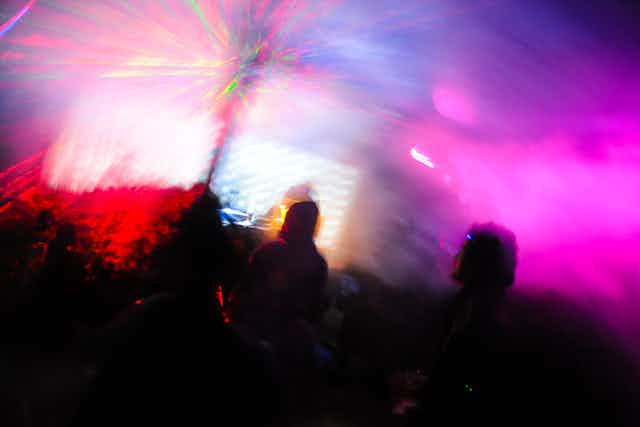Last week two young Australian women spoke candidly to the ABC about being sexually assaulted while on holidays. The alleged incidents occurred in Greece in 2022 and in Hawaii in 2019.
Both women described common symptoms of being drugged, including being unable to move or speak, blurred vision, lack of coordination and memory loss.
Both found a needle mark after they woke up and believe they were “needle spiked”.
Read more: What is drink spiking? How can you know if it's happened to you, and how can it be prevented?
What is needle spiking?
Needle spiking is when a person is injected with a drug without their consent. Reports of needle spiking started to emerge in the UK in 2021 but it’s now been reported around the world, including in Australia.
Needle spiking is usually reported by people who have been at a crowded bar or party. It’s generally reported by women but some men have also reported being needle spiked.
We don’t have data on how often needle spiking happens, but we think it’s very rare. There have been only a few reports of needle spiking in Australia but none of them have been able to be confirmed.
Often these types of incidents are not reported at all because often victims don’t remember what happened or there’s no way to identify the perpetrator.

We don’t know exactly what drugs might be used in needle spiking incidents, but they would likely be similar to drugs commonly used for drink spiking. These include colourless, odourless sedatives like Rohypnol, GHB and ketamine.
People who suspect they were needle spiked may have blood or urine testing afterwards. But there’s no real way to be sure any drugs detected in someone’s system were from a needle incident. And often no sedatives are detected by the time testing happens.
How does it happen?
It’s very difficult to inject someone without them noticing, especially in a crowded venue where people are moving a lot. Needles need to be injected fairly carefully and it would take several seconds to get enough of a drug into the system to have an effect. It would also be almost impossible to inject enough of a drug to incapacitate someone through clothing.
So generally, a person would probably feel the prick of the needle and notice the drug going in.
It is theoretically possible to inject someone without them knowing, using a very thin needle. They may be less likely to notice if they’ve had a couple of drinks. But also it’s less likely you would find a needle mark with a very thin needle.
If needle spiking occurs, a more likely scenario may be that someone has their drink spiked, and the injection happens after they’re incapacitated from the drink spiking. This might be done to ensure someone stays sedated, but we don’t know the reasons for sure.
Read more: Weekly Dose: GHB, a party drug that's easy to overdose on but was once used in childbirth
Drink spiking is much easier and is probably much more common than needle spiking, although we don’t have good data on the prevalence of drink spiking either.
By far the most commonly used drug in drink spiking is alcohol. Extra or stronger alcohol might be added to an alcoholic or non-alcoholic drink.
More rarely other drugs are used such as benzodiazepines (like Rohypnol), GHB or ketamine. These drugs have sedative effects that can result in loss of consciousness, memory loss and sometimes hallucinations or feeling like you are outside your body.
There is minimal data about sexual assault after drink spiking as most incidents are not reported, but some data suggests around one-third of drink spiking incidents end in sexual assault.
What to do if think you’ve been spiked
If you were injected with any of the substances mentioned above you would feel the effects nearly immediately. If your drink has been spiked, it takes longer for the substances to enter your system, so you might feel the effects with enough time to get help.
Some of the warning signs you may have been spiked include:
- feeling lightheaded
- feeling sick or unusually tired
- feeling drunk despite only having a very small amount of alcohol
- feeling like you might faint or pass out, or you actually pass out
- feeling confused when you wake up
- being unable to remember what happened the previous night.
If you think you’ve been drink or needle spiked, you should ask someone you trust to help get you to a safe place, or talk to venue staff or security if you’re at a licensed venue.
If you feel very unwell you should seek medical help, such as at an emergency department.

How can you protect yourself?
Stick to venues you know and that have a good reputation for safety. If you’re at a venue where you don’t feel comfortable, don’t stay.
Keep your drink close to you and don’t leave it unattended. Don’t share drinks with other people, especially if you don’t know them well, and buy your drinks yourself. If you’re offered a drink by someone you don’t know well, go to the bar with them and watch the bartender pour your drink.
If you think your drink tastes weird, or you start to feel strange or unwell, tell someone you trust straight away. Keep an eye on your friends and their drinks too.
If you’ve been a victim of drink or needle spiking and want to talk to someone confidentially, you can call the National Alcohol and other Drug Hotline on 1800 250 015.
For information about sexual assault, or for counselling or referral, you can call The National Sexual Assault, Family and Domestic Violence Counselling Line – 1800 RESPECT (1800 737 732).

